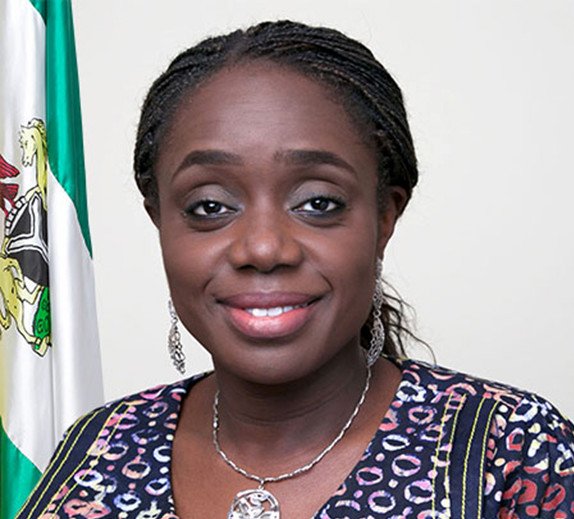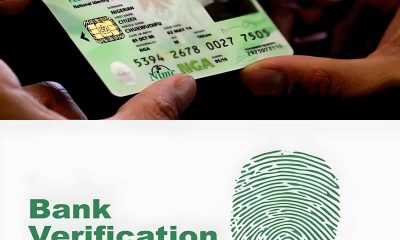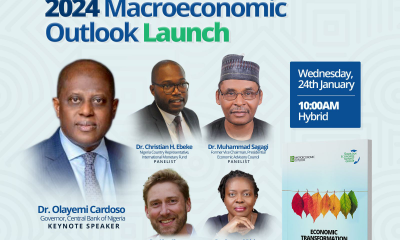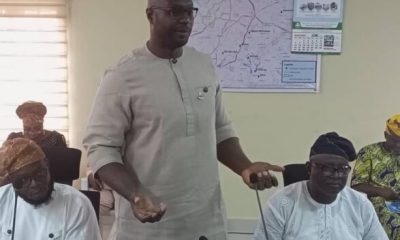Business
Telecoms sector to bridge budget deficit
Published
7 years agoon
By
Olu Emmanuel
By Adedeji Fakorede
The International Monetary Fund (IMF) has warned that Nigeria’s budget gap will probably be larger than Federal Government’s estimates this year because revenue from taxes and state companies will be lower than forecast.
In Article IV report that followed meetings with Federal Government officials, it said the budget deficit may reach 3.7 per cent of gross domestic product (GDP) this year, higher than President Muhmmadu Buhari’s projected gap of 2.8 per cent. The gap was 2.8 per cent last year, preliminary estimates show. It was 4.7 per cent on a consolidated basis.
“The larger deficit would likely have to be financed domestically, further raising yields and crowding out private-sector credit,” the IMF said.
Buhari’s N7.3 trillion ($23.1 billion) budget for this year to boost infrastructure investment and help the ailing economy recover from a contraction of 1.5 per cent last year, the first such slump since 1991. The economy was weighed down by a drop in the price and output of oil, its biggest export, which led to dollars crunch.
According to the Ministry of Budget and National Planning, the government has a revenue target of N2 trillion from oil and N1.37 trillion from non-crude sources including tax collections.
While the government is undertaking tax reforms under the new seasoned tax master, Chairman of the Federal Inland Revenue Service (FIRSC), Mr. Babatunde Fowler, to increase revenue collection, the impact of those measures will be gradual, the IMF’s Mission Chief in Nigeria, Gene Leon, said on a call with reporters.
Although the naira has fallen 36 per cent against the dollar since the Central Bank of Nigeria (CBN) removed a peg in June, investors say Governor Godwin Emefiele is preventing it from dropping further through trading and import restrictions and regular sales of foreign exchange.
The currency is as much as 20 per cent overvalued, Leon said. A depreciation of that size would take it to about 390 per dollar, almost matching the black-market rate of 398.
The average yield on the government’s naira-denominated debt has risen 424 basis points over the past year to 16 per cent, the highest level among 31 major emerging markets tracked by Bloomberg after Egypt.
Nigeria will probably raise debt from more Eurobond sales this year, the IMF said. These, together with concessional financing from the World Bank and the African Development Bank (AfDB), will make up 60 per cent of external debt. The government will also issue 10-year promissory notes equivalent to 2.2 per cent of GDP to settle domestic arrears, it said.
This debt is in addition to a $500 million Eurobond sold last month as part of the 2016 budget and $1 billion raised in February.
The Federal Executive Council (FEC) approved a 21-year $1.3 billion loan with the World Bank, AfDB and other institutions at two per cent, Finance Minister Mrs. Kemi Adeosun told reporters in the capital, Abuja. The money will be used for the new Development Bank of Nigeria that will lend small businesses long-term funding.
ALSO SEE: Inflows from Abroad drops for second consecutive year
The Federal Government said it expects budget-support loans of at least $1 billion from the World Bank, and a final, $400 million portion of a $1 billion credit facility from the AfDB.
While the National Bureau of Statistics (NBS) estimates that the telecoms sector contributes about 11 per cent to the GDP but desirous of improving the level of efficiency in tax management and revenue generation through deployment of technology, the NCC and FIRS has set up a Revenue Quality Assurance Committee (RQAC) for the telecommunications sector.
This was the highpoint of the discussions between Executive Vice Chairman (EVC) of the NCC, Prof. Umar Danbatta and Fowler after a courtesy visit of the tax czar to the NCC Headquarters.
Director, Public Affairs, NCC, Tony Ojobo, said the joint committee with four members each from the two organisations was to specifically examine and suggest ways through which the level of transparency could be attained via technology in tax management for FIRS and the returns from Annual Operating Levy (AOL) for the NCC.
The Joint Committee, which is scheduled to meet this week, he added, should also see how workers matters, including payments are addressed. It is also to audit the states and explore the benefits accruable to them in terms of taxes collected.
The Joint Committee is expected to work out a recommendation to facilitate the Type Approval of telecoms equipment that can be used for a transparent assessment of the operators’ revenues.
Danbatta expressed concerns over the shutting down of Base Transceiver Stations (BTS) in the states indiscriminately without recourse to the Commission.
“This is worrisome as it undermines the capacity to provide telecom services, thereby denying consumers good quality of services,” he told Fowler.
The EVC cited the resolution of the National Economic Council (NEC) on Multiple Taxation, Levies and Charges on ICT Infrastructure in Nigeria dated March 21, 2013, saying the document is very clear on the issues of multiple taxations, levies, Right of Ways (RoWs) among others.
Danbatta appealed to the FIRS chief “to help propagate the provisions of the policy to the Joint Tax Board (JTB)”, which he chairs.
Fowler had earlier expressed worries over the taxes being collected from mobile network operators (MNOs) in the states.
According to him, the concern stemmed from the fact that MNOs do not remit the Value Added Tax (VAT) already charged as at when due. “While some decide when they will remit it, the law stipulates that such taxes must be remitted to the FIRS between 20/21 of each month. Some too have not fulfilled the annual returns,” he lamented.
In an earlier working document sent to the Commission, the FIRS had requested the permission of NCC to connect its equipment to the MNOs networks for a direct interface to which Prof. Danbatta had responded that such equipment must go through the Type Approval process.
He said the NCC sees collaboration with the FIRS as a decision in the right direction.
This, he added, underscores what Buhari said about the collaboration of inter-governmental agencies, which saw to the timely completion of the Nnamdi Azikiwe International Airport, Abuja ahead of the time schedule.
You may like


Amid challenges, World Bank gives Nigeria’s NIN registration pass mark


Economic hardship: Phase out electricity and fuel subsidies completely — IMF tells FG


Nigerian Economic Summit Group calls for registration for NESG 2024 Macroeconomic Outlook Launch


Cash transfers can save Nigerians from falling deeper into poverty – World Bank


Oyo State Government seeks World Bank’s support


Group scolds World Bank over subsidy crisis
Trending

 Football1 week ago
Football1 week agoGuardiola advised to take further action against De Bruyne and Haaland after both players ‘abandoned’ crucial game

 Health & Fitness1 day ago
Health & Fitness1 day agoMalaria Vaccines in Africa: Pastor Chris Oyakhilome and the BBC Attack

 Featured5 days ago
Featured5 days agoPolice reportedly detain Yahaya Bello’s ADC, other security details

 Comments and Issues7 days ago
Comments and Issues7 days agoNigeria’s Dropping Oil Production and the Return of Subsidy

 Education6 days ago
Education6 days agoEducation Commissioner monitors ongoing 2024 JAMB UTME in Oyo

 Business6 days ago
Business6 days agoMaida, university dons hail Ibietan’s book on cyber politics

 Business5 days ago
Business5 days agoDebt servicing gulps 56% of Nigeria’s tax revenue, says IMF

 Crime6 days ago
Crime6 days agoPolice take over APC secretariat in Benue

